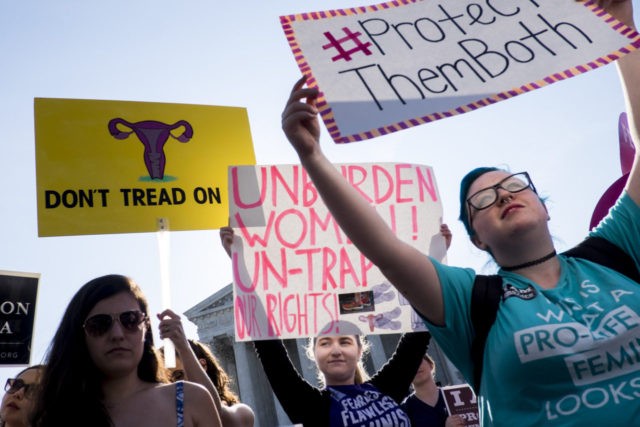WASHINGTON, D.C. — Pro-life supporters suffered their worst defeat in many years on Monday at the U.S. Supreme Court in Whole Woman’s Health v. Hellerstedt, as Justice Anthony Kennedy sided with pro-abortion forces for the first time since 1992, striking down Texas’s HB2 for violating abortion rights.
HB2 is a statute requiring abortion doctors in the Lone Star State to have admitting privileges at a hospital within 30 miles of their abortion clinic. The state law also requires every abortion facility to meet the equipment and sanitation standards of an ambulatory surgical center.
In 1973, the Supreme Court declared in Roe v. Wade that the Constitution implicitly contains an unwritten right (called an “implied right”) to abortion. Roe suggested that this is a fundamental right, one where the constitutional requirements shift based on which trimester the pregnancy is in.
In 1992, the Court decided Planned Parenthood v. Casey, where the justices voted 5-4 not to overrule Roe. But the Court invented a new test to replace the trimester framework, holding that abortion is a right that can be regulated at any level of government, so long as restrictions on abortion before the unborn child is viable outside the mother’s womb do not impose an “undue burden” on the woman seeking an abortion. Casey also allows postviability abortion restrictions so long as they are “reasonable.”
Ever since 1992, Justice Anthony Kennedy had not voted to invalidate an abortion law as an “undue burden” — until today.
Writing the Hellerstedt opinion in this 5-3 decision, Justice Stephen Breyer declared:
We conclude that neither of these [challenged] provisions offers medical benefits sufficient to justify the burdens upon access that each imposes. Each places a substantial obstacle in the path of women seeking a previability abortion, each constitutes an undue burden on abortion access, and each violates the Federal Constitution.
Justice Ruth Bader Ginsburg joined Breyer’s opinion, but also filed a separate concurring opinion, citing various liberal briefs and arguments about how abortions are safe for women. “Given those realities, it is beyond rational belief that H. B. 2 could genuinely protect the health of women, and certain that the law ‘would simply make it more difficult for them to obtain abortions.’”
The principal dissent was 36 pages long, written by Justice Samuel Alito, joined by Chief Justice John Roberts as well as Justice Clarence Thomas.
Alito began by noting that this is the second time these plaintiffs have challenged this Texas law, and that normally such a lawsuit would be blocked from being relitigated by the same parties (a doctrine called res judicata).
On that issue, Alito concluded:
In sum, the Court’s holding that petitioners’ second facial challenge to the admitting privileges requirement is not barred by claim preclusion is not supported by any of our cases or any body of lower court precedent; is contrary to the bedrock rule that a party cannot relitigate a claim simply because the party has obtained new and better evidence … In a regular case, an attempt by petitioners to relitigate their previously unsuccessful facial challenge to the admitting privileges requirement would have been rejected out of hand—indeed, might have resulted in the imposition of sanctions … No court would ever think of revising such a claim on its own. But in this abortion case, ordinary rules of law — and fairness — are suspended.
Alito then turned to the merits of the case, noting that HB2’s challengers did not provide evidence sufficiently supporting their arguments, especially on whether HB2 caused abortion clinics to close. Instead, “the most serious problem with the Court’s reasoning is that its conclusion is belied by petitioners’ own submissions to this Court,” he wrote.
HB2 was considered a relatively minor restriction on abortion. The fact that a majority of the Supreme Court held that such an incidental burden on obtaining abortions violates the Constitution does not bode well for the pro-life movement, and accentuates the stakes of November’s presidential election.
Justice Thomas also dissented separately, beginning:
Today the Court strikes down two state statutory provisions in all their applications, at the behest of abortion clinics and doctors. That decision exemplifies the Court’s troubling tendency “to bend the rules when any effort to limit abortion, or even to speak in opposition to abortion, is at issue.”
Though joining the principal dissent written by Alito, Thomas explained, “I write separately to emphasize how today’s decision perpetuates the Court’s habit of applying different rules to different constitutional rights — especially the putative right to abortion.”
Noting that Casey’s undue-burden test specifically downgraded abortion from the vaunted pedestal Roe had placed it upon, rejecting Roe’s treating abortion like a fundamental right, Thomas added that today, “the majority eviscerates important features of that test to return to a regime like the one that Casey repudiated.”
“Our law is now so riddled with special exceptions for special rights that our decisions deliver neither predictability nor the promise of a judiciary bound by the rule of law,” Thomas wrote.
After a thorough analysis, quoting a 1989 law review article from his friend, the late Justice Antonin Scalia, Thomas concluded his 16-page dissent:
Today’s decision will prompt some to claim victory, just as it will stiffen opponents’ will to object. But the entire Nation has lost something essential. The majority’s embrace of a jurisprudence of rights-specific exceptions and balancing tests is “a regrettable concession of defeat—an acknowledgement that we have passed the point where ‘law,’ properly speaking, has any further application.” I respectfully dissent.
Ken Klukowski is senior legal editor for Breitbart News. Follow him on Twitter @kenklukowski.

COMMENTS
Please let us know if you're having issues with commenting.